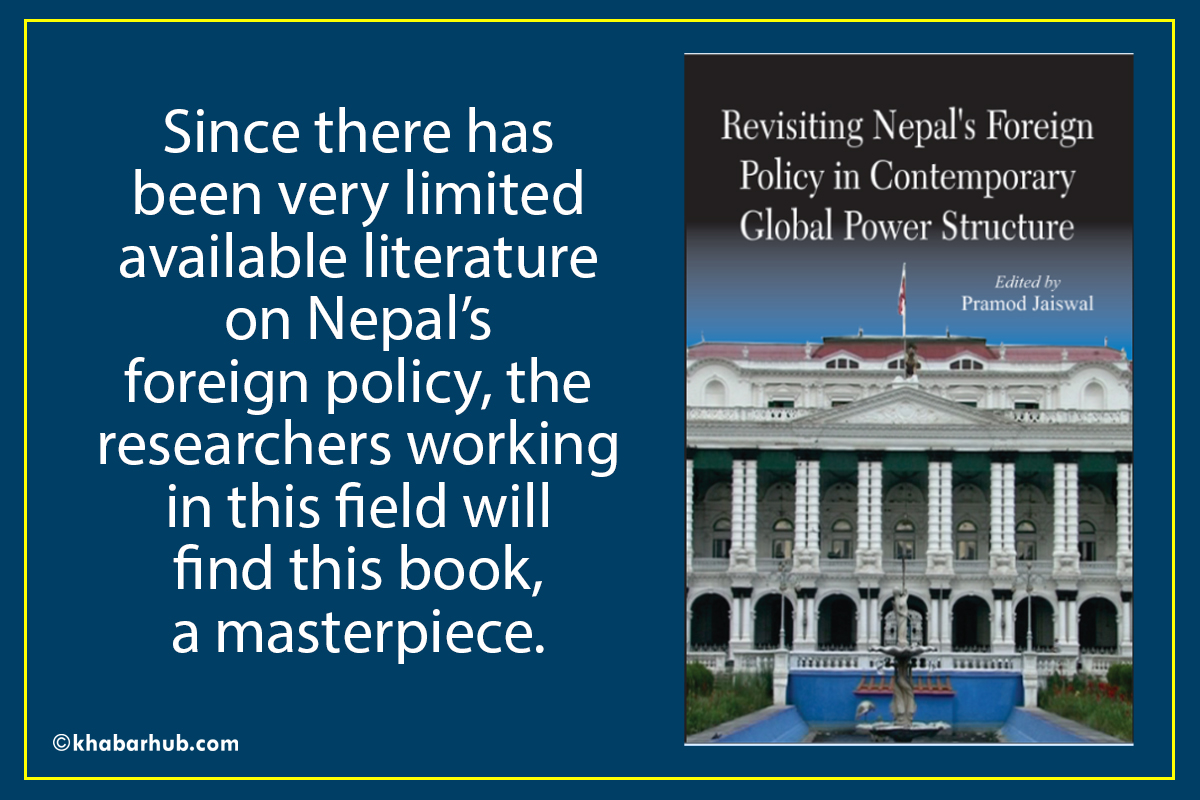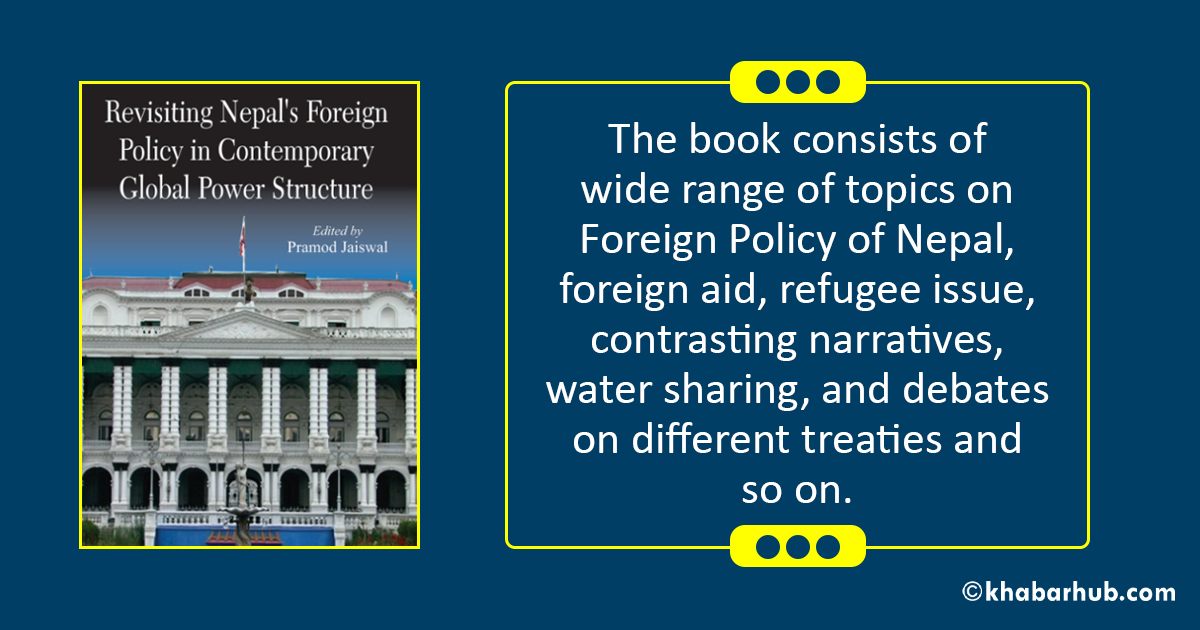The foreign policy of Nepal is the least research subject, despite being one of the vital tools of Nepali statecraft since the beginning.
Frequent change in the Nepali political system from monarchy to the Federal Democratic Republic in the changing global power structure has made the need for reorienting Nepal’s foreign policy.
Amid such need, Nepalese scholar Pramod Jaiswal, Research Director of Nepal Institute for International Cooperation and Engagement has edited the book, ‘Revisiting Nepal’s Foreign Policy in Contemporary Global Power Structure,’ which is published by the G.B. Books, New Delhi.
As the title itself suggests, the books present an account of various aspects of Nepalese foreign policy, especially its implementation in bilateral ties with the various countries.
The book contains 26 chapters from scholars of different countries including Nepal, India, Bangladesh, Pakistan and the US.
It explains the determinants of Nepal’s foreign policy, its historical backgrounds, peak and plains in its relationships with the neighbors, opportunities and challenges in the changing global context and the need of the hour.
It analyzes the behavior and objectives of small nations, like Nepal and others, in international politics.
It also covers Nepal’s role in the regional and multilateral forum with a special focus on the South Asian Association for Regional Cooperation (SAARC).
The first chapter is by Pramod Jaiswal, editor of the book on “Survival of the Small States in World Politics: Foreign Policy Strategy” where he explains the behavior of small states in world politics, their foreign policy formation, and strategies to survive and benefit from the international system.
The chapter further analyzes the behavior and objectives of small nations, like Nepal and others, in international politics.
Rohit Karki, in his chapter “Strategic Autonomy: Nepal’s Perpetual Quest for Change in the Face of Continuity,” explains that Nepal’s quest for change in foreign policy is contingent on its ability to institutionalize autonomy in its foreign policy.

He suggests that Nepal’s success will depend not just on coping with the challenges in the regional and international environment, but on developing ‘strategic autonomy’ in conduction of its foreign policy in the twenty-first-century world.
Nazia Khan analyzes the determinants of the foreign policy of Nepal and the challenges it faces being a small state.
Palu Joshi highlights the relations between British India and Monarchial Nepal while Mahesh Acharya reviews the 1950 Indo-Nepal Treaty of Peace and Friendship.
Kalpana Khanal sheds some light on India-Nepal diplomatic relations in a historical context and delves into various treaties between Nepal-India.
This book is an excellent source of information for the various organizations and individuals working in the field of Foreign Policy, such as Think Tanks, diplomats, politicians, academicians, policymakers, young aspirants of Foreign Service jobs, etc.
Aparna critically analyzes India’s role in Nepal since 2015 and in the Madhesi movement. Shaista Tabassum analyses how river water sharing is politically settled and how the lower riparian (India) diplomatically protected its rights from a weak upper riparian state (Nepal).
Piyali Dutta also looks at the case of water sharing between India and Nepal. Sangit Sarita Dwivedi critically examines the growing influence of China in Nepal and tries to analyze the implications for India and recommends policy options to enhance India’s relations with its neighbors and Chanchal Kumar also focuses on Nepal’s deepening engagement with China and sees it as a challenge to India.
Monica Verma looks at the bilateral relations between India, Nepal, and China. Divya Agnihotri has done a comparative study of the variegated dimensions of the evolution of the bilateral dynamics of these Himalayan states with special reference to India.
Supreeta Mehta traces the predicament of the Tibetan refugees of Nepal.
Gaurav Bhattarai analyzes political, economic, cultural, and psychological aspects of bridge (between India and China) metaphor that is often used for Nepal. Vijay Jayshwal highlights the triangular cooperation between India, Nepal and China.
Md. Abul Kashem and Md. Shariful Islam have identified the major issues and opportunities that define Nepal-Bangladesh bilateral relationship.
Binod Kumar Singh also highlights the dynamics of Nepal-Bangladesh relations. Gulbin Sultana highlights the challenges and prospects of Nepal-Sri Lanka relations.
Md. Afroj traces the evolution and historical development of Nepal-Israel relations and concludes with the challenges they face.
Ipshita Bhattacharya examines whether the relationship between the US and Nepal have strategic configurations. Varsha Gautam and Charu Ratna Dubey look at the opportunities and challenges of Nepal-Canada relations.
Melissa Cyrill explains Nepal’s relations with the Gulf Cooperation Council Countries.
Sucheta Pyakuryal and Sean Lahav in their chapter “Impact of Foreign Aid in Nepal” argue that despite the benevolence of foreign aid contributions to Nepal, there are certain underlying consequences behind the country’s continued acceptance of international aid contributions, including negative impacts on the civil society, bureaucratic norms, and its overall infrastructure.
The book is well-researched. Since there has been very limited available literature on Nepal’s foreign policy, the researchers working in this field will find this book, a masterpiece.
It also covers the behavior of small states like Nepal in International forum, Nepal-India relations at the time of British Raj, rapprochement of Nepal-India relations after 2015, critical overview of the 1950 Indo-Nepal Treaty of Peace and Friendship, Trilateralism and several others.
This book is an excellent source of information for the various organizations and individuals working in the field of Foreign Policy, such as Think Tanks, diplomats, politicians, academicians, policymakers, young aspirants of Foreign Service jobs, etc.
The book has provided a well-integrated collection of chapters centered on Nepal’s foreign policy with clarity in simple language making it suitable for readers of different backgrounds and age groups.
The book holds the potential to be the supplementary reading for various courses like International Relations, South Asian Studies, and Nepal Studies, etc.
The book consists of a wide range of topics on Foreign Policy of Nepal, foreign aid, the refugee issue, contrasting narratives, water sharing, and debates on different treaties, and so on.
Most of the chapters are on the bilateral relations of Nepal with various countries. However, it also covers the behavior of small states like Nepal in International forum, Nepal-India relations at the time of British Raj, rapprochement of Nepal-India relations after 2015, critical overview of the 1950 Indo-Nepal Treaty of Peace and Friendship, Trilateralism and several others.
As the price mentioned in the book is a little expensive that might hit the students. However, it could be found on the racks of big libraries for interested ones to get the reading benefit.
(Aruna Ghimire is Research Associate with NIICE)
(Nepal Institute for International Cooperation and Engagement (NIICE), Nepal’s independent think tank, and Khabarhub — Nepal’s popular news portal — have joined hands to disseminate NIICE research articles from Nepal)









Comment